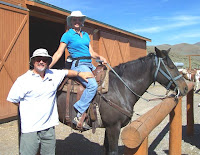A caller to the radio program awhile back asked a good question, one that livestock-owning country dwellers ought to also consider:
"I want to plant some trees or shrubs that will grow quickly to hide the view of a new house going in next to us," said the caller. "But I don't want to plant anything that might be poisonous to our horses, which will eat just about anything. Any ideas?"
"There definitely are some plants that you should avoid," advises Dr. Frank Galey, now with the University of Wyoming, formerly the toxicologist at the California Veterinary Diagnostic Laboratory Systems at UC Davis.
"There definitely are some plants that you should avoid," advises Dr. Frank Galey, now with the University of Wyoming, formerly the toxicologist at the California Veterinary Diagnostic Laboratory Systems at UC Davis.
Highly poisonous plants that should not be planted within the reach of horses include:
oleander
The book, "The UC Davis Book of Horses" , says that the oleanders (of which all parts are toxic) can cause horses to develop diarrhea, colic and an irregular heartbeat.
, says that the oleanders (of which all parts are toxic) can cause horses to develop diarrhea, colic and an irregular heartbeat.
The book, "The UC Davis Book of Horses"
yews
"A yew can kill a pile of horses in a heartbeat," says Dr. Galey.
rhododendrons
azaleas
Rhododendrons and azaleas, which can cause severe colic or diarrhea, can often be found while on wilderness expeditions with your horses. They will be become hungry during prolonged treks and may eat any forage available at rest stops or campsites. A good piece of advice? Don't picket your horse near any shrubs.
Privet with berries
pieris
There are many, many more plants that can be toxic to horses, a list of which you can probably get from your veterinarian. "Toxic" has a wide meaning, from gastric distress to death. Among the other highly toxic plants that are commonly found in California:
the twigs and leaves of deciduous fruit trees, including apricot, cherry, peach and plum;
Foxglove
Lupine
Mountain Laurel
Nightshade
Oak acorns (in large quantities)
Sweetpea seeds
Tomato vines
PLANTS THAT ARE LEAST TOXIC TO HORSES
There are a number of trees and shrubs that can provide a quick screening effect; here are a few that will do well in our area of California and are the least toxic to horses:
* Eucalyptus. "Horses tend to leave eucalyptus trees alone," says Dr. Galey. For a quick, bushy screen, plant the Eucalyptus globulus 'Compacta', the dwarf blue gum, about six feet apart.
* Bottlebrush (Callistemon citrinus). This evergreen shrub can reach 15-20 feet tall, and is dotted with colorful, bright red bottlebrush-shaped flowers several times throughout the year. "We haven't had any poison reports about the bottlebrush, so it should be pretty safe," says Dr. Galey. "But because the plant attracts bees, it's possible the horse could be allergic to bee stings."
* Coast redwood (Sequoia sempervirens). Given ample water, this evergreen tree can grow several feet a year. It also has a low incidence of toxicity. Horses, though, may trample the lower branches.
It's up to the horse owner to be vigilant, patrolling the pasture regularly for unfamiliar plants, especially those that may pop up seasonally. Look for toxic plants near water tanks or ponds; along fence rows; or, roadside gullies that a hungry horse might reach.
This word of caution: anything eaten in mass quantities by a horse may cause medical problems. A good book that goes much more in depth on this topic is "The Horse Owners Field Guide to Toxic Plants
So, if you have horses that have never missed a meal, you may want to install a horse fence or hot wire between the screening plants and your ravenous friends.








Please remember to be careful where you plant any trees. Take into account overhead wires, driveways, underground pipes, and above ground structures.
ReplyDeleteHow about the red fall leaves on maples? I have heard that they are quite toxic.
ReplyDeleteWhat about for donkey's and sheep is the bottlebrush harmful to them aor cows?
ReplyDeleteI was wondering if green bean plants or zucchini peels? I have an older horse that is not gaining to weight like he should before winter.. I was thinking any corn stalks would be good..
ReplyDelete